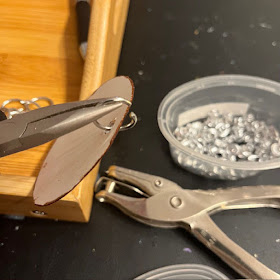I am super excited to have designed my first ever StencilClub set, Textile Elements! The two new stencils reflect my love of pattern, design, fabrics, and sewing. Inspired by my years as a textile print stylist in the fabric business in New York City's Garment Center, I created the stencils as a tribute to the many designs I selected, colored, and printed over the years.
A journal painting was the inspiration that started me thinking about designing the Club Set. On my lunch break, I often painted to unwind and relax. I kept a small 6" khadi watercolor journal in my desk with a few other supplies: Derwent Inktense blocks, watercolor pencils, and a brush. One of my favorite lunchtime paintings was the inspiration for my StencilClub October set.
 |
| On the left: my lunchtime art journal page that inspired the Textile Elements set. You can see in the tag on the right how the lines and shapes of both flowers were adapted and translated into stencils. |
ABOUT MY NEW STENCILS
The Textile Elements set consists of two stencils: the Floral Elements stencil, which has interlocking floral heads, leaves, and several stems, and the second stencil, Textile Patterns, with assorted favorite small designs.
What makes my stencils unique is that the flowerheads and leaves each have two parts, which gives more depth and design possibilities than if it was just one flat shape. The poppy, tulip, and two posies each interlock and fit together perfectly, as do the leaves, just as they would in a fabric design.
The Textile Patterns combine nicely with the florals, with each other, or can be used on their own. I included shapes I personally love: a stylized tulip border designed from one of my hand-carved stamps, assorted dots, a repeating tile design adapted from another of my hand-carved stamps, a calligraphy-inspired "button trio" derived from a doodle, a traditional "ditsy floral," and an assortment of stitches.
 |
| I created allover designs, frames, and an assortment of greeting cards with my Textile Elements StencilClub set. |
Here are some process pictures that I took when testing out the floral elements stencil:
 |
| Above, I am carefully removing the stencil after aligning the poppy pieces, which were stenciled with light and dark pink ink. |
 |
Here you can see the lime green outer leaf shape and the stencil with the inner shape, about to be aligned.
|
The Textile Patterns stencil has an assortment of designs that can be mixed and matched or used in the background. Here's a sample with three experiments. At the top, I tested the repeat of the tile design. On the bottom, I tested the repeat on the "ditsy floral." In the middle, I experimented with combining several stitches and dots to create a plaid effect.
On the pastel allover pattern below, I used nearly all of the designs from both stencils. Wouldn't it make a great design for fabric or wallpaper? A summer dress? Or maybe festive wrapping paper? The possibilities are endless!
Below is a frame I made using elements from both of the Textile Elements stencils with earth-tones. I cut the black, white and beige stenciled papers into 2" pieces and arranged them to create a quilt-inspired frame. Isn't it amazing how the earth-tones give an entirely different look to the patterns than pastels or primary colors?

MY TEXTILE STORY
After studying Textile Design at the Fashion Institute of Technology, I began my art career working for a small company called Leon B. Rosenblatt Textiles. I met with textile designers from around the world, choose designs, selected colors, and went each Friday afternoon and Saturday morning to a small hand screen printing plant in SoHo. There, we experimented with that week's new designs and endless color combinations.
Each season we produced hundreds of new patterns, each with 4-5 colorways. I also traveled frequently to large rotary screen print plants in Rhode Island and Alabama where I "struck off" new designs and matched thousands of yards of fabric to the hand screen printed samples.
It was always exciting to see clothing for women and children made with our fabric in retail stores or on models in fashion magazines and catalogues. Better yet was seeing people in real life around the country wearing clothing made from our fabrics.
MY STENCILCLUB PROJECT
Interested in learning how I used my new Club stencils to make this pretty botanical-inspired floral inside a faux-quilted frame? If you're a StencilClub member, you will receive an email with directions to access to the "how to" video as well as the step-by-step pdf of my project.
 |
| My October 2024 StencilClub project: a botanical-inspired central floral surrounded by a faux-patchwork quilt frame trimmed with embossed gold zigzag stitches. |
If you're not a StencilClub member, now is the perfect time to join! Details about StencilClub are on the StencilGirl website. With membership, you also get access to our private StencilClub Facebook group, where you can connect with like-minded artists and participate in the monthly small art trades that I facilitate.
Interested in seeing all my other stencils? Just click
here to view my designs, see samples and videos, read a little about what inspired the stencils, and learn about my personal art journey.






















%20adj.jpg)






























